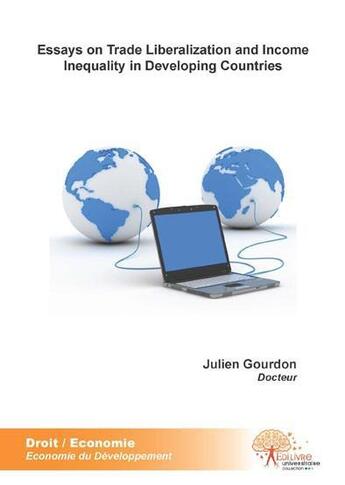Des idées de lecture pour ce début d'année !
Passionné(e) de lecture ? Inscrivez-vous
gratuitement ou connectez-vous pour rejoindre la
communauté et bénéficier de toutes les fonctionnalités du site !

This thesis âoeEssays on Trade Liberalization and Income Inequality in Developing Countriesâ is in three essays.
The first deals with the hypothesis that countries trade according to their factor endowments: this is the factor abundance theory of Hecksher-Ohlin. In this first paper we test if the âoenewâ determinants help us to improve our estimation of trade patterns in commodities. The results show that HOV is âoealive and wellâ and furthermore that the âoenewâ determinants have not more explanatory power in the period 1980-2000 compared with the period 1960-1980. That factor endowments matter is especially robust concerning specialization according to human capital endowment. More generally, the results in this chapter provide a further justification for our concentration in the next chapter on factor endowments as factors contributing to explain why trade has different effects on income inequality.
The second deals with the heterogeneity among developing countries concerning factor endowments and the fact that all factor endowments do not benefit of trade openness even when there are important in a country. The results show that trade openness raises income inequalities both for non educated abundant countries and for highly educated abundant countries. Inversely trade liberalization decreases inequality for countries well endowed in primary educated labor. Our results suggest that countries with at least 20% of primary educated labor will have decreasing inequalities during their liberalization, whereas countries with at least 20% of no educated labor will have increasing inequalities.
The third chapter deals with wage inequality and South-South trade. Globalization does not only lead to increasing North-South (N-S) trade, the direction and composition of trade has also changed. As developing-country markets become more important for other developing countries and the future trade liberalization will mainly concern South-South trade, we need to examine closely their trade policies and their impact on inequality. The chapter establishes several findings. First, we observe that South-South trade increases wage inequality in developing countries, and mainly in middle income countries. Second since S-S trade increases competitiveness in skill intensive products, S-S trade appears to bring technological change more biased towards skill intensive sector than N-S trade. The fact that S-S trade is more skill intensive sector oriented increase wage inequality for all developing countries (included low income countries).
Il n'y a pas encore de discussion sur ce livre
Soyez le premier à en lancer une !

Des idées de lecture pour ce début d'année !

Si certaines sont impressionnantes et effrayantes, d'autres sont drôles et rassurantes !

A gagner : la BD jeunesse adaptée du classique de Mary Shelley !

Caraïbes, 1492. "Ce sont ceux qui ont posé le pied sur ces terres qui ont amené la barbarie, la torture, la cruauté, la destruction des lieux, la mort..."